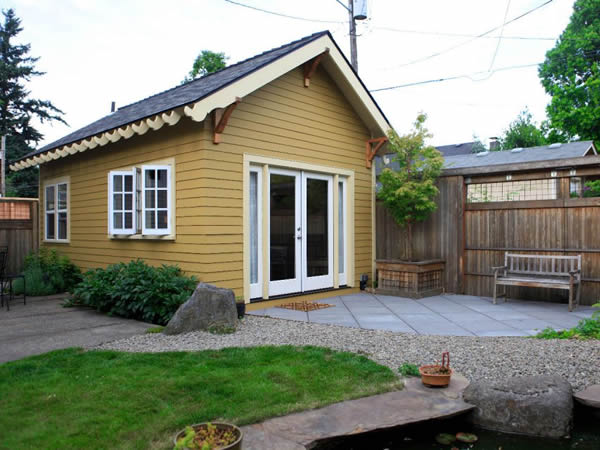 Progressive Voice is a weekly opinion column. The views and opinions expressed in the column are those of the individual authors and do not necessarily reflect the views of their organizations or ARLnow.com.
Progressive Voice is a weekly opinion column. The views and opinions expressed in the column are those of the individual authors and do not necessarily reflect the views of their organizations or ARLnow.com.
By: Lisa Nisenson
Last week, former State Senator and Arlington County Board member Mary Margaret Whipple kicked off Affordable Housing month with a Progressive Voice column advocating more housing options, such as introducing small multi-family dwellings and accessory dwellings (ADs). In making the case, Senator Whipple cited the benefits of housing variety, while acknowledging concerns about how new housing types fit into existing communities.
Of the expanded housing options, accessory units such as backyard cottages and in-law suites, have the greatest near-term potential to add lower-cost housing options across the County.
 In 2008, Arlington updated codes and regulations for accessory units, though homeowners and construction companies still face code barriers that outweigh the benefits of constructing ADs. While safety — such as fire codes — drives many of the requirements, other elements related to parking and design deserve closer scrutiny.
In 2008, Arlington updated codes and regulations for accessory units, though homeowners and construction companies still face code barriers that outweigh the benefits of constructing ADs. While safety — such as fire codes — drives many of the requirements, other elements related to parking and design deserve closer scrutiny.
The stated purpose for these elements is largely to lower impacts on surrounding properties, though it is unclear (1) whether the impacts exist to the degree anticipated and (2) whether the required design requirements effectively prevent or reduce impacts. Given the housing pressures on an increasing number of Arlington residents, our entire community needs to come together on a platform of “what works” rather than expansive code written to anticipate and regulate every “what if.”
Fortunately, other cities have adopted — and fine-tuned — programs that offer ideas for shaping policies, programs and design elements for neighborhood-friendly accessory units. Here is a snapshot of how programs are shaping up:
Portland, Oregon: In general, Portland has the most ambitious AD program with lower parking requirements and permit fee reductions. While most cities with ADs require owner occupancy either in the main or accessory unit, Portland eliminated this rule in 1998. Three years ago, the state surveyed homeowners to determine (1) how ADs are used and (2) information on concerns such as parking.
The results? By and large, ADs are rented for out for extra income, typically to a single occupant. For parking, one-third of units report using the street (for the other units, 20% of dwellers do not own a car or homeowners provide off-street parking). Portland also places a high value on design and quality.
Seattle, Washington: Seattle has taken a more incremental and targeted approach to rolling out its AD program. Like Arlington, Seattle manages parking (though based on proximity to transit instead of on-street parking capacity), minimum lot sizes and design standards. Also like Arlington, Seattle’s housing crisis is driving a renewed effort for promoting accessory units through regulatory reform and incentives.
Novato, California: Novato created a new class of units: Junior Accessory Dwelling Units. These units are modified interiors within existing homes to create a separate living space. The city waives requirements for parking and fire codes while making special provisions for building small-scale kitchen facilities.
As it responds to escalating housing costs, Arlington should consider other trends affecting housing. New mobility options, notably bike share, car share such as Car2Go and on-demand ride hailing — such as Uber — are helping drive down car ownership rates and the related need for parking.
Also, an increasing number of retiring baby boomers are finding decreasing options for “aging in place” and “aging in neighborhood.” Yet there are few downsizing options other than apartments, and restrictive rules prevent the use of space in existing homes to provide a downsizing option while giving homeowners income to cover taxes and maintenance.
A big wild card is the availability of short term rentals — like Airbnb — that were barely on the radar in 2008, but are now reshaping parts of the real estate and hospitality industry. Here in Arlington, our County Board is considering the legal and tax framework for short term rentals. The Virginia General Assembly is also expected to revisit statewide legislation that could restrict local governments’ ability to regulate short-term rentals.
Currently, Arlington’s code makes building guest houses for temporary guests easier than building accessory units for long-term, stable renters. Without new rules, the County may be in a position where economic incentives favor “Airbnb cottages” over new, stable housing units.
As Arlington implements the Affordable Housing Master Plan and rules for accessory dwellings, look for discussions on allowing detached dwelling units (as opposed to attached or in-house units currently allowed), fire code requirements, site requirements such as lot coverage and enforcement.
If you are new to the topic of ADs, the website Accesorydwellings.org is an exhaustive resource, with links to a design gallery, research, policies and case studies.
Lisa Nisenson is Founder of the urban planning startup GreaterPlaces, named a “Top 10” resource by the planning authority Planetizen. She holds positions on the American Planning Association’s Sustainable Communities Division and Smart City Task Force. She is a long time Arlington civic advocate from Lyon Park.
Image: Raleigh, N.C.

